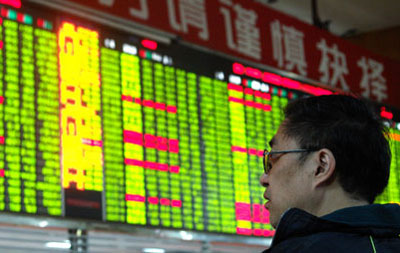Investors should take the long view
By Tim Paradis (AP)Updated: 2007-02-12 06:25
 An investor looks at stock information at a securities company in Zhengzhou, Henan Province January 26, 2007. [newsphoto]  |
NEW YORK -- Many mutual funds that invest abroad had sizable 2006 gains that bore the stamp "made in China," but recent volatility in that country's stock markets has cast some doubt on this year's returns.
In what some have likened to the feverish nature of the dot-com bubble in the United States, Chinese investors have poured enormous sums into the country's mainland stock markets in the past 1 1/2 years.
Although the investment possibilities in China might seem as broad as the country itself, mutual fund investors should be careful to avoid simply chasing the outsize stock market returns. Opportunities remain, though they might be accompanied by unsettling volatility that mutual fund investors would want to avoid if they are not prepared to hang on for the long-term.
Last year, share prices more than doubled in China, soaring 130 percent. But in recent weeks, after regulators at the Shanghai Stock Exchange warned that the markets were becoming overheated, volatility has increased and led at times to back-to-back sessions of pullbacks.
"The volatility is something investors should've expected all along, especially after the big run-up that we've seen," said Arijit Dutta, an analyst with Morningstar, an investment research provider. "Generally, we tend to discourage people from investing in a single-country fund. Many investors may not be able to stomach the ups and downs and end up using the funds badly by buying at the wrong time and selling at the wrong time."
And volatility is only likely to increase as stocks rise, said Liang Zhou, research manager for China at fund-tracker Lipper. "Even though the market is no longer cheap now, investors still want to invest."
Liang, who is based in Shanghai, expects the Chinese economy will continue to grow at about 10 percent annually but predicts investors' returns will fluctuate. The country has been tightening regulations of some of its stock markets, particularly those on the mainland.
"We also find the quality is increasing fast," Liang said of the stock markets in China and the companies listed there.
Mainland stock markets, such as the Shanghai Stock Exchange, have weaker financial controls than those in Hong Kong, where regulatory controls are akin to those in other developed markets in Europe, the United States and elsewhere in Asia.
Most U.S. mutual funds that invest in China do so through Hong Kong, thereby skirting some of the concerns about volatility seen in the mainland markets. Volatility in mainland markets doesn't necessarily produce ripples in Hong Kong.
"The retail investors in China are not sophisticated investors," Straszheim
said. "They are much more speculators. The markets run on rumor, and the
regulatory regime is still not fully developed."
| 1 | 2 |  |
|
||
|
||
|
|
